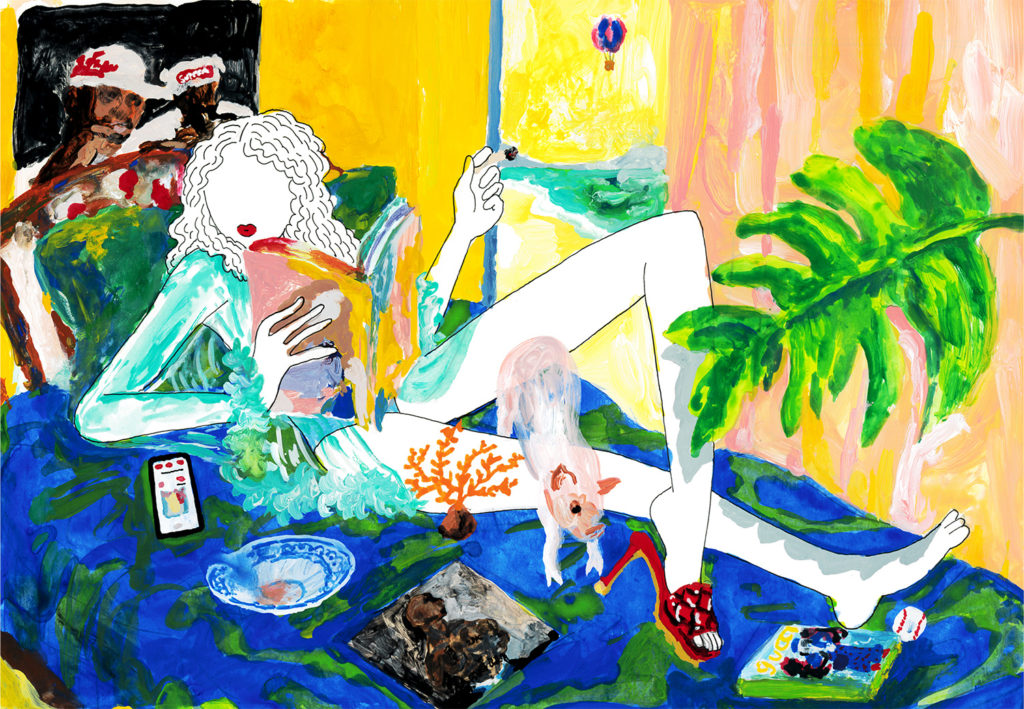When we look at the relationship between music and fashion, as well as the relationship between fashion trends and youth culture, we get a clearer understanding of the times we live in. In this series, Tsuya-chan, the writer behind the article “2010s Analysis: A Look at Trap Music, Fashion Trends, and More,” analyzes current cultural events by examining contemporary music, with a focus on Japanese hip hop.
Until now, she has focused on Versace, but from this point onwards, she will shift her attention to Gucci and the reasons behind its dominance in street fashion, youth culture, and the world at large. In this article, she writes about Gucci’s agility and how that quality influenced rap music.
The nonstop evolution of Gucci and its creative director
Five years ago, nobody could’ve predicted how Gucci would dominate the world to this extent. Lyst, a data-driven fashion platform, published its third quarterly fashion index and named Gucci the “hottest brand” of 2020. Although people expected consumers’ shopping habits to change because of COVID-19, it appears the brand is still showing no signs of losing their popularity.
Alessandro Michele had just been appointed as the creative director of Gucci five years ago when he quoted French philosopher Roland Barthes for his 2015-16 AW collection: “The Contemporary is the Untimely.” Thus began the brand’s new momentum. Michele’s magical creation was kitsch and not dictated by gender norms, which wasn’t the trend at the time. However, the collection proved to be like a twisted fairy tale for young people, one that stirred feelings of confusion, fear, and even sorrow. No designer took this approach, and in that sense, perhaps the collection was “untimely.” It’s widely known by now that the brand became the center of contemporary fashion afterward.
Michele’s geeky, both girl-like and boy-like inner world turned into Gucci’s creation, and it became a high-selling luxury brand all over the globe. If you take a step back and think about it, this trajectory is intriguing and could even sound like a joke. In the past, the fashion house saw creative directors like Tom Ford and Frida Giannini, who had very different aesthetics from each other but were similar in the sense that their vision was more realistic compared to Michele. Meaning, Gucci’s trademark is its ability to change its character according to the zeitgeist and influence the relationship between brands and society. The Italian fashion house relied on the vision of each creative director and deftly changed its appearance accordingly. Now, this might sound like the norm these days, but Tom Ford’s Gucci was the first of its kind to allow a creative director to project their ideas onto a brand in a variety of ways. This is untimely because today, brand marketing, based on detailed data analysis, is dramatically evolving.
Gucci’s agility opened a path of possibilities for rap music
In 2017, Lil Pump’s “Gucci Gang” was a massive hit, and by 2019 Gucci Mane collaborated with the brand. Gucci has had a lot of exposure through contemporary rap music, so much so it’s impossible to fit everything here. Of course, the brand’s popularity stems from Michele’s daring aesthetics and foresight, and the brand’s agile attitude towards change. Interestingly, Gucci’s agility is reflected in rap lyrics too, and it has opened up new possibilities within the genre.
In terms of domestic rap music, the most famous example of the use of Gucci in lyrics is DABO’s “Lexus Gucci”, released in 2001. It was well-received as a Japanese rap song that was instrumentally and lyrically on par with U.S. hip hop. Further, the high-quality bounce beat and the hook, “the Don Corneo of Lexus Gucci,” took over the club scene, and the name of Gucci, designed by Tom Ford at the time, reverberated throughout the dance floor. Since then, the brand has been mentioned frequently in rap, but ZEEBRA’s “Baby Girl”, which came out the following year, is worthy of being analyzed.
In the song, he says, “go on dates/real high pitch/if we don’t get along, then it’s a part-time bitch/meet up and go shopping/Prada Gucci Pucci,” and you can already tell how agile the word, “Gucci” is. It goes without saying that “high pitch,” “part-time bitch,” “Gucci” and “Pucci” rhyme together, but more than that, Gucci acts as a bridge that connects fellow brand names, Prada and Pucci. Gucci’s ability to become a bridge symbolizes the fashion house’s flexibility. In my previous article, “The Symbolism of Versace in Japanese Rapper’s Lyrics,” I talked about how Versace ends with an affricate sound (“ch”), and the same applies to Gucci. This flirtatious and vulgar, yet short and light sound makes it possible to rhyme with a lot of words, such as the ones mentioned above.
The brand name’s flexibility is even more apparent in Kohh’s “Bimbo Nante Kini Shinai”, released in 2014. Regarding his lyrics, “it’s expensive to show off/Louis, Gucci, Versace,” the affricate sound is in both Gucci and Versace, and once again, Gucci acts as a bridge between two brands. In the song, Kohh pronounces “Gucci” without leaving a space between “Gu” and “cci.” He freely changed the traditional pronunciation of the word to rhyme it with Louis; Gucci’s ability to place itself between different sounds is another testament to its dexterity.
With the “ch” sound at the end, Gucci has proven itself to be a free-forming entity. Regarding the brand itself, I reckon it’s necessary to talk about their expression of sexuality over the years. I will break down the intimate relationship between the words “Gucci” and “bitch,” which speaks to an instinctual spirit inside of us. I hope to unravel the secrets they hold in the next column on Gucci.
Illustration AUTO MOAI
Translation Lena-Grace Suda


